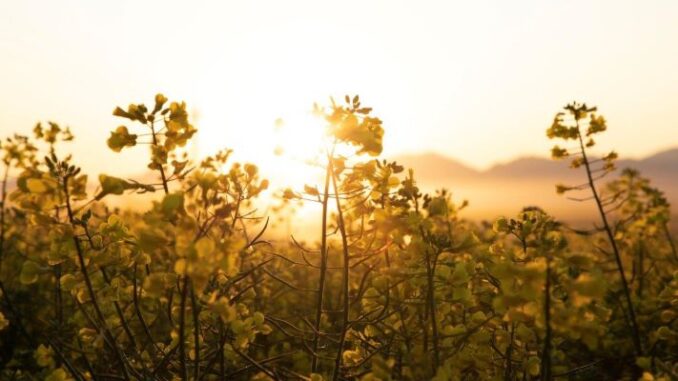

As the annual canola harvest begins to wind down across various regions in South Africa, Southern Oil (SOILL) anticipates an impressive total yield of over 220,000* tons of canola seeds, marking the highest record to date.
You may have seen the vibrant yellow canola flowers that graced fields across the Western and Eastern Cape over the winter. As summer takes hold, these crops are now being harvested to produce the canola oil that will find its way into a variety of canola-based products, including B-well oils, dips, and mayonnaises.
Although this year’s harvest is ongoing (it commenced in early October and will be concluding towards the end of this month), the predicted total yield is notably impressive. In just four years, the harvest is expected to surge by over 130,000 tons, escalating from 94,317 MT in 2019 to an anticipated 220,000 tons this year. Zander Spammer, Agricultural Resource Manager at SOILL, attributes this record-breaking yield to three key factors: “Favourable weather, enhanced canola cultivars, and improved farming practices.”
Contributing to the Harvest
SOILL, an oil extraction plant and edible oil refinery located in Swellendam, is South Africa’s largest purchaser of canola. It is committed to providing healthier alternative oils and works closely with local farmers to optimise their yields, ensuring a higher return on their crop investments. The support from Mr. Spammer and his team at SOILL includes guidance on soil preparation, cultivar selection, and optimal harvest timing.
The 2023 harvest is underway over the 120,198 hectares of canola planted within the provinces of Western Cape and Eastern Cape, predominantly in the Southern Cape, Overberg, and Swartland regions. These regions are ideal for canola cultivation due to their excellent soil quality, winter rainfall, and warm, dry summers, facilitating early autumn canola planting. The rains of the past year have also particularly favoured the growth of canola.
The Harvest Process
Canola has been locally cultivated for almost two decades, with only non-GMO canola seeds used in SOILL’s products. Once the canola flowers fall off the plants, they leave behind pea pod-like pods containing canola seeds. Most local farmers will cut the canola plants and allow them to dry out before harvesting the pods and preparing them for transportation. Upon reaching the regional silos, rigorous testing and grading are conducted to ensure the seeds meet strict technical specifications before they are stored in silos once more, awaiting transportation to the extraction plant in Swellendam or Morreesburg.
Community Involvement
SOILL is dedicated to community development, not only through job creation and advancement but also via the Canola Development Trust. The Trust, owning 15% of SOILL, reinvests in the local hands that plant and harvest the canola. Its primary focus is on providing educational interventions for the children of the farm workers supplying canola to SOILL. This is facilitated through the CanoLees literacy program and CanoTel numeracy program, managed by the non-profit organisation CAP and taught in schools in areas like Barrydale, Bontebok, and Uitvlug, among others.
Agriculture Collaboration
60% of SOILL is held by the Sentraal-Suid Co-operative, an agricultural co-operative delivering products and services to the agricultural industry. A further 18% is held by the Employee Trust, made up of all permanent employees of SOILL, while the remaining shares are privately owned. The Sentraal-Suid Co-operative (SSK) promotes growth, diversification, and collaboration, ensuring that SOILL consistently promotes the best farming practices. The SSK and SOILL agriculture teams work together to optimise education for the farming community, with the overarching goal of making South Africa self-sufficient and less reliant on imports to address food and oil shortages in the country.
Global Impact on Pricing
While South Africa predominantly relies on domestically produced canola oil, it remains a net importer of all fats and oils. This means that South Africa does not produce sufficient products for its demand and is reliant on imports. Local vegetable oil production has steadily increased, rising by 4.3% from 2021 to 2022, but imports grew by 12.0% during the same period. This while total consumption decreased slightly by -1.30% year on year, highlighting the pressure on consumer spending. The reliance on major vegetable oil-producing countries leaves South Africa vulnerable to price volatility. Recent global events such as the war in Ukraine, droughts in Spain and South America, the Turkish ban on olive oil exports, and production constraints in Malaysia have all influenced local oil prices. These factors underscore the importance of supporting local produce.
Through its efforts, SOILL will continue to advocate for local farmers and locally produced goods, to make South Africa self-reliant and less susceptible to the fluctuating prices of global oil, thereby promoting competitive pricing.
* Total yield tonnage accurate at the time of distribution. The canola harvest is still ongoing and this number might fluctuate slightly.
ern oil extraction plant and edible oil refinery situated in Swellendam, Western Cape, and is committed to the provision of healthier alternative oils. Every product within their national and international distribution channels maintains the highest quality standards. Additionally, SOILL has diversified into manufacturing various other edible oils and related products. Its products include B-well, a range of oils, mayonnaise, and dips, African Gold, a premium locally-grown extra virgin olive oil blend, Nuts About Cooking coconut oil, and Canega animal feed products.
